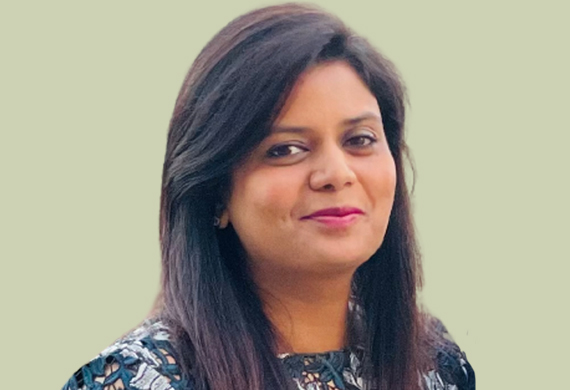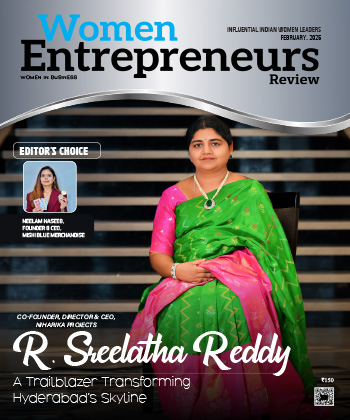
All About Women's Financial Independence & How to Achieve It
By: Riddhima Doshi, Director, Madhav Marble & Granite Ltd., India
Riddhima Doshi is the Director at Madhav Marble and Granite Ltd., an India-based enterprise specializing in the global export of natural stone for 35 years now. Riddhima, who joined the business twelve years ago, oversees its financial operations and strategic initiatives. She has been adept and future-ready in steering the company’s growth with utmost financial due diligence.
In a recent interview with Women Entrepreneur Magazine, Riddhima walks us through how women can spearhead the corporate world and facilitate financial independence
In your view, how does financial independence contribute to overall empowerment and well-being for women?
Financial independence holds paramount significance for women, as it bestows upon them a profound sense of security and a safety net to fall back on in times of adversity. It empowers them to vocalize and stand against any form of wrongdoing or unjust treatment, whether emanating from a family member or an employer. When a woman is self-sufficient, she need not compromise or subject herself to circumstances detrimental to her self-worth and peace of mind. This autonomy contributes significantly to mitigating injustice within society and fosters genuine equality, ensuring that women are not only heard but also respected in their rightful pursuit of success and fulfillment.
What are some common misconceptions or stereotypes that women face regarding financial matters, and how can these be addressed?
A prevailing misconception in society perpetuates the notion that women excel primarily in creative domains, while men inherently possess superior numerical acumen. This fallacy is, in my view, a significant misjudgment. I firmly believe that women exhibit remarkable proficiency in managing household finances and cash flows. To dispel this myth, it is imperative for women to actively engage in financial matters, whether about their personal accounts, family finances, or company funds. By stepping forward and demonstrating their adeptness in handling numbers and investments, women can dismantle this unfounded belief. The transformation should commence at the grassroots level, where women first equip themselves with the skills to manage their finances, subsequently extending their competence to oversee family and company financial matters. This progressive shift will not only debunk stereotypes but also pave the way for a more inclusive and balanced financial landscape.
What are the potential economic and societal benefits of increasing the financial independence of women?
The advantages of women attaining financial independence are indeed manifold and far-reaching. From an economic perspective, it fosters inclusivity, augmenting the overall workforce and thereby bolstering the nation's GDP. Even in developed nations like the United States, the proportion of women in the workforce remains below its potential. Hence, the integration of women into the workforce can drive significant economic benefits. Moreover, on the domestic front, this independence translates to a boost in household income. Consequently, families have greater disposable income to allocate towards their children's education, overall well-being, and nutrition. In addition, elevating household income equips families to nurture the next generation in a more enriched manner.
It is evident that when women actively participate in financial matters, the resources available for nurturing future generations are substantially enhanced. This, in turn, leads to a more prosperous and secure future for families and society as a whole.
In your opinion, how significant is financial education for women in attaining financial independence?
Acquiring a formal degree in finance is not an obligatory prerequisite for every woman seeking financial independence. While possessing an educational background in accountancy, MBA, or BBA can undoubtedly be advantageous, it's important to recognize that not everyone may choose to pursue a financial degree. With the accessibility of global knowledge, there are plethoras of opportunities for self-improvement. With platforms like YouTube and an abundance of crash courses available, individuals can equip themselves with financial acumen from the comfort of their homes, often just using a mobile device. Also, a wealth of videos covers a wide range of topics including finance, investments, and stocks. Additionally, delving into newspapers, engaging in discussions, and seeking insights from others can be immensely beneficial. Therefore, the abundance of resources means that sincere individuals aspiring for financial independence have ample opportunities to learn, without the necessity of a formal course.
How can mentorship and networking opportunities support women in their journey towards financial independence?
Indeed, mentoring and networking play pivotal roles in the pursuit of financial independence. Establishing connections with individuals entrenched in the banking sector, mutual funds, and stock markets provides invaluable insights and a real-time understanding of the financial landscape. Furthermore, engaging in meaningful discussions with them offers a broader perspective, enabling one to stay abreast of current market trends and the array of financial instruments available. Also, regularly perusing newspapers further enriches one's comprehension of economic and taxation matters. By aligning oneself with the right individuals and resources, one can effectively navigate the financial terrain, even without a formal finance degree. These tools, when utilized judiciously, empower individuals to confidently manage their finances and make informed investment decisions.
Most Viewed
- 1 Women's Health Startup HerMD Closing Doors Amid Industry Challenges
- 2 5 Famous Women in Indian Armed Forces
- 3 Saudi Women No longer Require Male Permission for Clothing Choices, says Prince MbS
- 4 Kolkata Medtech Startup Innovodigm Raises Rs 5.5 Crore Seed Funding Led by IAN Group
- 5 Yamunanagar's Kashish Kalra Honoured after Securing 111th Rank in UPSC Civil Services Exam
- 6 Madurai Appoints Its First Woman Corporation Head
- 7 IAS Vijayalakshmi Bidari Appointed as the new Nagpur Divisional Commissioner
- 8 American Entrepreneur Lucy Guo Overtakes T Swift to become Youngest Female Billionaire
- 9 ICC Women's World Cup 2025 Trophy Showcased at Indore's Holkar Stadium
- 10 Aparna Saxena's Beauty Venture AntiNorm Launches in India
- 11 Vidya Nataraj Co-Founded BlueStone Jewellery & Lifestyle files IPO
- 12 5 Women Freedom Fighters of India
- 13 Dr. G Krishnapriya appointed as CEO for Trichy
- 14 M3M & Sirona Partner to Introduce Menstrual Hygiene Vending Machines in 15 Locations
- 15 Punjab Govt launches SHE Cohort 3.0 Supporting Tech-led Women Startups
- 16 Indian origin Lawyer, Sweena Pannu appointed as the US New Superior Court Judge
- 17 The Aurora Tech Award recognizes 4 Indian Women-led Startups
- 18 Kerala's Republic Day parade featured an all-female tableau
- 19 Manisha Kabbur Becomes Karnataka's First Woman International Karate Coach
- 20 Director K. S. Ravikumar's Daughter Maalica Ravikumar Launches Life Coaching Company 'Evergrowth Academy' for Women
- 21 Leezu's Raises Pre-Seed Funding to Accelerate Growth in Sexual Wellness Industry
- 22 Sattu: Super-easy summer drink for PCOS gut healing
- 23 Swathi Nelabhatla creates Sitha App, India's First Women-Exclusive Gig Platform
- 24 7 Timeless Female Kathak Dancers & their Iconic Legacies
- 25 Meet 7 Iconic Women Architects of Modern India & their Most Impactful Work
- 26 This Woman-led Insuretech Startup is Helping Bridge the Education Financing Gap in India
- 27 Women Leaders Share Lessons Learnt from India Women's WC Win
- 28 5 Enterprising Women Founders Powering Singapore's Tech & Innovation Landscape
- 29 4 Women. 4 Stories. One Vision for Smarter, Stronger Healthcare
- 30 Global Gender Gap Narrows to 68.8%, But Full Equality 123 Years Away: WEF Report 2025
- 31 Changemakers: 7 Women Entrepreneurs Taking the Make in India Movement Forward
- 32 Meet Lucy Guo, The Youngest Self-Made Female Billionaire Disrupting Tech
- 33 How Women are Driving India's Festive Online Shopping Surge






